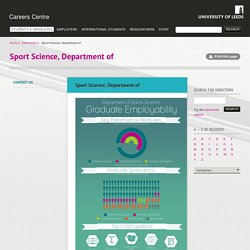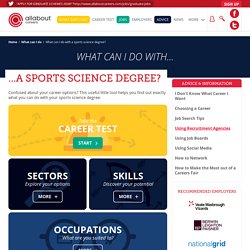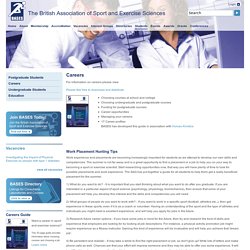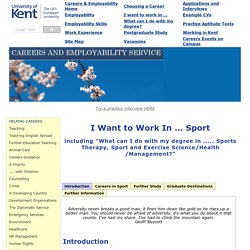

Downloads. Sport Science, Department of. Sport Science, Department of Key measures: Positive Outcomes: 94.8%, Graduate prospects: 62.5%, Graduate employment: 54.3% Graduate destinations: Work Full-time: 58%, Work Part-time: 14%, Work & Study: 3%, Further study: 21%, Unemployed: 4% Top industry sectors: Education; Event Management, Leisure, Hospitality & Tourism; Buying, Selling & Retail; Health & Social Care; Administration Salary levels: Under £10,000: 27%, £10,000-£19,999: 46%, £20,000-£29,999: 23%, £30,000-£39,999: 0%, Over £40,000: 4% The Leeds Network We have an extensive network of alumni with a wide range of experiences, doing all kinds of jobs.

What can I do with a sport science degree? The sports industry is competitive but a sport science degree can set you up with key skills, which can help you to succeed in many careers Job options Jobs directly related to your degree include: Jobs where your degree would be useful include: Remember that many employers accept applications from graduates with any degree subject, so don't restrict your thinking to the jobs listed here.

Work experience Look for opportunities that match the career you would like to go into. Children's summer holiday schemes that have a strong sports section can give good experience. Search for placements and find out more about work experience and internships. Typical employers Jobs are available with a range of organisations in the public, private and not-for-profit sectors. Employers include: As a sport science graduate you may also go on to set up your own business or consultancy. Find information on employers in healthcare, leisure, sport and tourism, teaching and education, and other job sectors.
What can I do with a sports science degree? Skills As a sports science student, your skills are in demand across a range of different sectors.

Aside from your knowledge of exercise physiology, sports psychology and biomechanics, here are some skills that your degree might have helped you to develop… Analytical Skills You’re better than Shearer and Hansen put together. You’re even better than Gary Neville. Commercial Awareness You know the business world like the back of your hand. Communication (Oral) All mouth, no trousers? Data Handling You can compile, organise and analyse data. Independence You don’t need somebody holding your hand the entire time. Leadership You’re a shepherd, not a sheep. Logic You ain’t no fool! Numeracy Forget 2 + 2 = 4, you’ve got the numeracy skills to give Carol Vorderman a run for her money.
Problem Solving You’re a bit like Jimmy McNulty in The Wire. Teamwork You’re not an angry loner. What can I do with a Sport and Exercise Science degree? Steve Carter, Career Consultant talks to us about the wide range of options available to Sport and Exercise Science students and why it is so important to be able to promote the transferable elements of your degree course.

So, what can you do with a degree in Sport and Exercise Science (SES)? This is a question that I am sometimes asked by SES students themselves, and by some employers who think that all SES students do is play football and rounders all day! The short answer to this question is anything, or at least the 60/65% of graduate jobs that are not asking for any specific degree discipline. This percentage increases for SES students as they can obviously do those graduate roles that do require specific sports related knowledge (of which more below) and careers related to biomedical sciences. I often find that when speaking to SES students (or indeed any students) that they are not always sure of what they have learnt from their degrees. To combat this Dr. Prospects MoreLife. Coach Education - University of Leeds. BASES - Careers. For information on careers please view Please feel free to download and distribute.

Choosing courses at school and collegeChoosing undergraduate and postgraduate coursesFunding for postgraduate coursesCareer opportunitiesManaging your careers17 Career profiles BASES has developed this guide in association with Human Kinetics Work Placement Hunting Tips Work experience and placements are becoming increasingly important for students as we attempt to develop our own skills and competencies. The summer is not far away and is a great opportunity to find a placement or a job to help you on your way to becoming a sport or exercise scientist. 1) What do you want to do? 2) What groups of people do you want to work with? 3) Research future career options - If you have some jobs in mind for the future, then try and research the kind of skills and experience that employers are looking for by looking at job descriptions. BASES - The British Association of Sport and Exercise Sciences. Sport and Leisure Careers. Adversity never breaks a good man, it fines him down like gold so he rises up a better man.

You should never be afraid of adversity, it's what you do about it that counts. I've had my share. I've had to climb the mountain again. Geoff Boycott Introduction This section has been written for students in the School of Sport and Exercise Sciences. Don’t forget to look at the other sections of this website though such as: Home. Magazine - Online Edition - Careers in Sport.